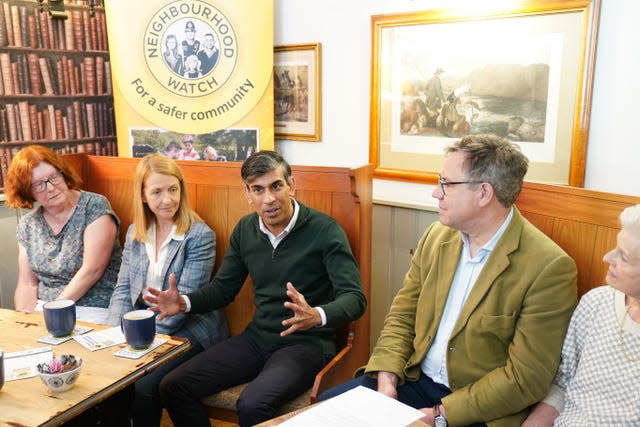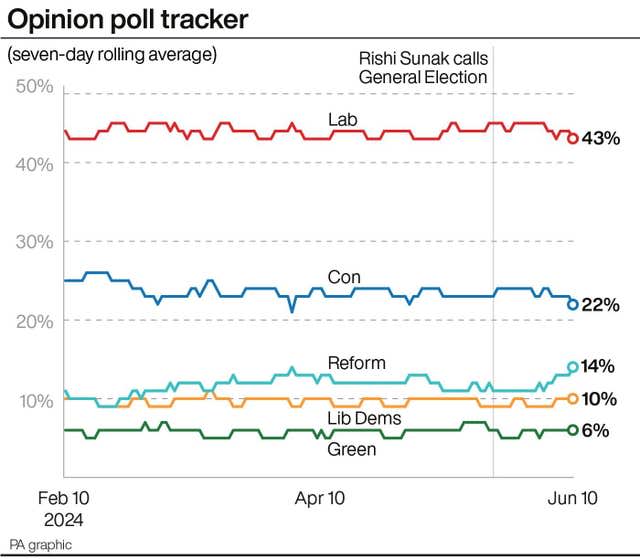Sunak to pledge 2p national insurance cut and first-time buyer help in manifesto
Rishi Sunak is expected to put tax cuts and help for first-time buyers at the heart of the Conservatives’ election manifesto, with a flagship pledge to cut national insurance by a further 2p.
The Prime Minister’s offer looks set to include promises to slash the employee rate again, to 6%, and scrap capital gains tax for landlords who sell properties to their tenants.
Drawing on the legacy of Margaret Thatcher, he will seek to pitch the Tories as the party of “sound money” and draw dividing lines with Labour over reducing the burden for “earners, parents and pensioners”.
Work and Pensions Secretary Mel Stride said ahead of the launch of the policy document on Tuesday that the Conservatives are “not going to stop” cutting taxes.
“These are big, bold interventions to help the very people that you are referring to,” he told BBC Radio 4’s Today programme.
“We are making real progress now on getting taxes down but we are not going to stop there, and what you are going to hear later on with our manifesto today are some very bold moves to further reduce tax.”
The Government cut national insurance by 2p for the second time in the Spring Budget, at an average cost of around £10 billion a year.
The expected latest move would be part of the Tories’ stated long-term ambition to abolish the contributions entirely, which Labour has branded an unfunded spending pledge.
Mr Sunak, who acknowledged during a BBC interview that it has become harder for people to own their first home under the Conservatives, will also pledge to abolish stamp duty up to the value of £425,000 for first-time buyers and launch a “new and improved” Help to Buy scheme.
But economic experts warned there are questions that need to be answered on the equity loan plans, including details of the interest rate that would kick in after a five-year interest-free period.
Labour predicted the Tory manifesto will be the “most expensive panic attack in history”.

Channelling the spirit of Mrs Thatcher, who introduced the right-to-buy scheme which prompted a sell-off of council homes, and her tax-cutting chancellor Nigel Lawson, Mr Sunak branded the Conservatives “the party of the property-owning democracy”.
The Prime Minister will seek to revive a flagging campaign with the manifesto launch at Silverstone motor racing circuit in Northamptonshire after a bruising few days following a backlash over his early departure from D-Day commemorations.
Writing for The Daily Telegraph, Mr Sunak said: “Owning a home makes people more financially secure, gives them a stake in society and, as Mrs Thatcher said, is one of the main bulwarks of individual freedom.
“People should have the chance to buy their own home – it goes to the foundations of what we believe as Conservatives: we are the party of the property-owning democracy.”
In a sign of the threat faced from Labour as it enjoys a double-digit poll lead, the Tories earlier released campaign ads warning of a landslide for Sir Keir Starmer’s party.
“If you vote Reform, Labour or Liberal Democrat, you’ll hand Keir Starmer a massive majority and pay the price,” the advert says.
Mr Sunak say on Thursday the Conservatives had to take “difficult decisions because of Covid” before adding: “But we are now cutting taxes for earners, parents and pensioners.
“We are the party of Margaret Thatcher and Nigel Lawson, a party, unlike Labour, that believes in sound money.”

Mr Sunak has said his party’s policies would be paid for by cracking down on tax avoidance and welfare reform, including by getting more people into work.
The Tories estimate that measures to overhaul the benefits system would deliver an additional £12 billion by 2030, but the IFS has warned that that this “looks difficult in the extreme”.
The think tank has also said that whichever party wins the July 4 vote is likely need to cut the scope of the state or increase taxes to maintain levels of departmental spending.
Figures provided by the Organisation for Economic Co-operation and Development (OECD) have previously showed the UK’s current level of tax burden is the highest on record.
Statistics published late last year showed tax hit 35.3% of gross domestic product in 2022/23, a 0.9% increase on the previous year. This ratio is forecast to grow to 37.7% by 2029, with the Government’s freeze on tax ratios the dominant driver.
The Tories have previously pledged no increases to income tax, national insurance or VAT. They have also promised to increase the income tax personal allowance for pensioners – giving them a tax cut worth around £95 in 2025-26, rising to £275 in 2029-30.
Mandatory national service for 18-year-olds was among the first pledges by Mr Sunak and would require teenagers to choose between taking a 12-month placement in the armed forces or “volunteer” work in their community one weekend a month for a year.
Labour’s national campaign co-ordinator, Pat McFadden, said: “The one thing to know about the desperate series of unfunded commitments in the Tory manifesto is that the money’s not there.
“Their manifesto will be the most expensive panic attack in history. The Tories’ scattergun and unfunded commitments have racked up billions with no idea from them of how to pay for it.
“They used to care about economic credibility. Now, in their desperation, they spend every day torching whatever remnants of it they had left.”
Shadow health secretary Wes Streeting said the pledges were “Liz Truss’ mini budget on steroids”, though the Prime Minister has rejected parallels drawn between him and his predecessor, saying that his plans are funded.
Elsewhere, children under the age of 16 would be banned from buying highly caffeinated energy drinks under a Labour government.
Labour leader Sir Keir Starmer said the sale of drinks containing more than 150mg of caffeine per litre to under-16s is “not justifiable or acceptable”, adding: “We’ll stop it. I will always take the tough decisions necessary to keep our children healthy.”
It comes as Labour pushes its “child health action plan”, which includes creating an extra 100,000 urgent dental appointments for children in a bid to clear backlogs in England.


